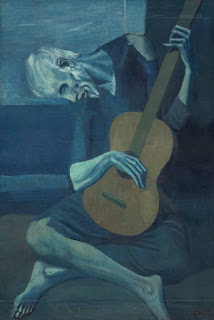Pablo Ruiz Picasso was a Spanish painter and sculptor who is one of the most influential artists of the 20th century. It is his ability to adapt and switch styles whenever necessary that allowed him to remain relevant and important. But even though he is considered to be one of the most famous artists ever, he was not always as successful or confident as he is made out to be. He was met with a lot of difficulties in his life that impacted his work and just like any other artist, he infused his own emotions into his art. This period of his career is known as the Blue Period and it is during this time that he made the painting, 'The Old Guitarist'. (1903)
As we can see, the painting is set in a blue tone. It was the death of his close friend, Carles Casagemas (who committed suicide by shooting himself in the middle of a dinner party due to an incident with his lover) that made Picasso start painting in blue. He chose this colour to show the affliction in him through his work of art. The Old Guitarist, an oil painting on canvas, was created at the height of this Blue Period. This painting features an old man who we can surmise to be destitute because of his worn-out clothes. His frail skin and bony figure are also made quite visible. His closed eyes might also imply that he is blind and the environment that he is in goes to show that he is from the "lower class" of the society.
This man, slumped and lifeless in a corner, clutches the guitar close to his body. This man, on the verge of death, holds onto that instrument like he is holding on for dear life. It's like his art is his only peace of mind in the depths of the turmoil he is going through. There's a perfect correlation between this painting in a poem by Wallace Stevens which puts words to Picasso's belief that art is the lie to help us see the truth. It is named "The Man with the Blue Guitar" and it goes-
It highlights the fact that art is a place of solace for every artist. The things we cannot say out loud to the world are hidden in our artworks and I think that is true for every single artist in existence. Because in our art, we can be vulnerable. In our art, we can be our truest selves. There is this song by Olivia Rodrigo named "Scared of my Guitar" that goes-

Comments
Post a Comment